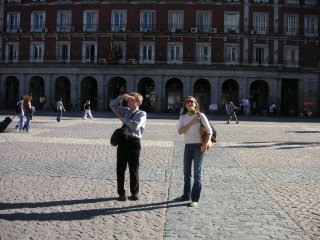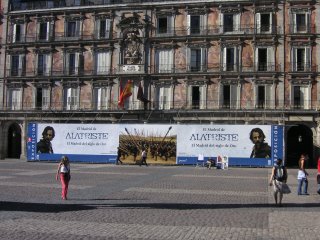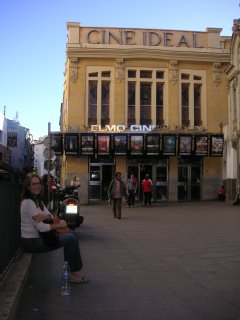 Scott Van Jacob, our area bibliographer, came to Madrid for the big book fair that is held for librarians at foreign university libraries. We had lunch with him at La Pepa 1812 (c/Zorrilla) and then took a walk over to La Latina to look at antiquarian bookshops. We stopped and took a picture in front of this candy store. Those are all caramelos behind us.
Scott Van Jacob, our area bibliographer, came to Madrid for the big book fair that is held for librarians at foreign university libraries. We had lunch with him at La Pepa 1812 (c/Zorrilla) and then took a walk over to La Latina to look at antiquarian bookshops. We stopped and took a picture in front of this candy store. Those are all caramelos behind us.
Then we walked to the Plaza Mayor and watched the people mill around.
 The big cinematic event this year was the premier of Spain's biggest-budget film of all time: Alatriste. The movie is based on the novels by Arturo Perez Reverte. For all you Spanish cultural critics out there: Isn't it interesting that the popular representative of the Spanish Golden Age--that most Spanish of times--is now the New Yorker Viggo Mortensen? You can go on a tour of Alatriste's Madrid, beginning in the Plaza Mayor, and see all the places that make the movie great. Viggo is not included.
The big cinematic event this year was the premier of Spain's biggest-budget film of all time: Alatriste. The movie is based on the novels by Arturo Perez Reverte. For all you Spanish cultural critics out there: Isn't it interesting that the popular representative of the Spanish Golden Age--that most Spanish of times--is now the New Yorker Viggo Mortensen? You can go on a tour of Alatriste's Madrid, beginning in the Plaza Mayor, and see all the places that make the movie great. Viggo is not included. So we went to the movies to see what all the fuss was about. And to see how well Viggo speaks Spanish. Not bad. But couldn't we have gotten Antonio Banderas for about half the price? We're just glad that Toby McElijia Wood wasn't hired to play Íñigo de Balboa, Alatriste's trusted sidekick and probable successor.
So we went to the movies to see what all the fuss was about. And to see how well Viggo speaks Spanish. Not bad. But couldn't we have gotten Antonio Banderas for about half the price? We're just glad that Toby McElijia Wood wasn't hired to play Íñigo de Balboa, Alatriste's trusted sidekick and probable successor.So, in the photo above you can see A in front of Madrid's Cine Ideal (now known as the Yelmo Cineplex), waiting for Celia and Loli to meet us for the 7:00 show. This is our favorite v.o. movie theater. V.o., by the way, means that films are projected here in their versión original, as opposed to being dubbed into Spanish. If you want to see Clerks II, for example, we suggest that you make sure to go to a theater that shows its films v.o., otherwise you are stuck hearing the otherwise wooden dialogues of Randal (Jeff Anderson) and Dante (Brian O'Halloran) in a robust, manly Castilian Spanish. In their case, dubbing might actually have represented an improvement since neither actor has learned to act in the intervening ten years since their high-schoolish performance in Clerks the First.
Clerks II is good. It is good primarily because of two things:
1. Rosario Dawson's performance as Becky. Although we really don't understand why she loves Dante.
2. Jason Mewes's performance as Jay. Let us just say that he was inspired in his adaptation of Ted Levine's dance number from The Silence of the Lambs. This scene literally makes the entire movie. Any movie that features "Goodbye Horses" in any way is okay with us. Click here for a clean version of Jay's dance.
And for all you Spanish cinema buffs out there, here is a bit of history about dubbing in Spain: Beginning in 1941, the Franco regime required that all foreign films be dubbed into Castilian in Spain by Spaniards. This was a part of his efforts to at once impose a monolithic Castilian linguistic and cultural identity on all Spaniards while simultaneously censoring American films through dubbing. Sometimes the censors were able to change certain elements of films that they viewed as subversive, profane, or in some way offensive to the state's officially sponsored Catholicism. But sometimes they shot themselves in the foot. In John Ford's Mogambo (1953), for example, Francoist censors attempted to purge the film of its adulterous plot elements. In the Spanish version of the film Grace Kelly and her husband were turned into brother and sister, which thus allowed Grace Kelly to fall in love with Clark Gable without the adulterous results of the original. Nevertheless, this not-so-subtle change turned their adultery into, you guessed it, incest.
Unfortunately, most foreign films are still dubbed in Spain. But dubbing is not only inflicted upon foreign films. In many Spanish films of the 1970s 80s and 90s, directors added sound after shooting, either for budgetary reasons or, most often, in order to make them sound more like "Hollywood" movies. Perhaps the most frustrating aspect of Spanish dubbing is the fact that, in spite of the common claim that Spain has "some of the best dubbing in Europe," the industry still employs adults to produce childrens' voices. Consequently, you still get terribly grating high-pitched fake voices for children in advertisements and television shows everyday. In Demark all foreign films are subtitled and shown in v.o. This promotes multi-lingualism in the viewing public and increases literacy.
 After the movie we walked home and had our usual dinner: ensalada, embutido, vino, pan. So good. So very good.
After the movie we walked home and had our usual dinner: ensalada, embutido, vino, pan. So good. So very good.
4 comments:
La cervetha parethe vino... Quithah es asi en Espainya.
I had the same question as pbegin, only in English.
I thought A might like this: http://www.andrewlipson.com/escher/relativity.html
*clicking on this link will not earn you $900.
Okay. So maybe we had a little too much wine. So much wine that it started feeling like beer. Thank you alert blog readers and friends for pointing this detail out. It's nice to know that someone is reading us, and that it's not just the fake blog spammers.
Good day,
CIAzzLIS
AMBzzIEN
VIAzzGRA
VALzzIUM
Econnomize over 50 % with http://www.deshikuiontunherpins.com
Post a Comment